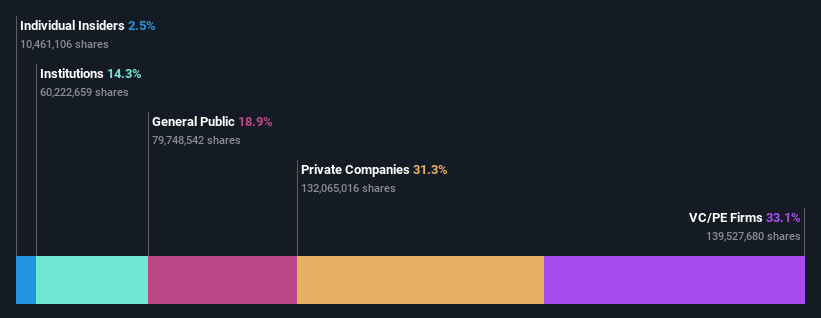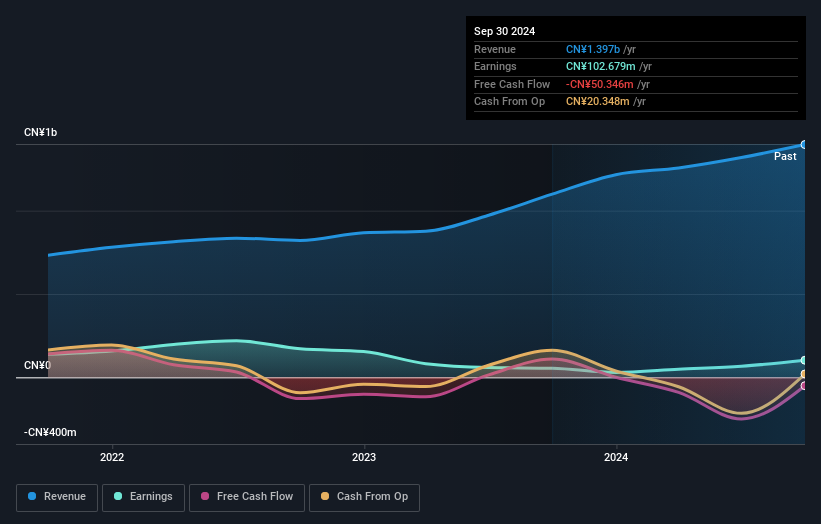- China
- /
- Semiconductors
- /
- SHSE:688209
Shenzhen Injoinic Technology Co.,Ltd.'s (SHSE:688209) market cap dropped CN¥768m last week; Private equity firms bore the brunt
Key Insights
- Shenzhen Injoinic TechnologyLtd's significant private equity firms ownership suggests that the key decisions are influenced by shareholders from the larger public
- 58% of the business is held by the top 3 shareholders
- Institutional ownership in Shenzhen Injoinic TechnologyLtd is 14%
If you want to know who really controls Shenzhen Injoinic Technology Co.,Ltd. (SHSE:688209), then you'll have to look at the makeup of its share registry. The group holding the most number of shares in the company, around 33% to be precise, is private equity firms. Put another way, the group faces the maximum upside potential (or downside risk).
And following last week's 9.8% decline in share price, private equity firms suffered the most losses.
Let's take a closer look to see what the different types of shareholders can tell us about Shenzhen Injoinic TechnologyLtd.
View our latest analysis for Shenzhen Injoinic TechnologyLtd

What Does The Institutional Ownership Tell Us About Shenzhen Injoinic TechnologyLtd?
Many institutions measure their performance against an index that approximates the local market. So they usually pay more attention to companies that are included in major indices.
We can see that Shenzhen Injoinic TechnologyLtd does have institutional investors; and they hold a good portion of the company's stock. This suggests some credibility amongst professional investors. But we can't rely on that fact alone since institutions make bad investments sometimes, just like everyone does. When multiple institutions own a stock, there's always a risk that they are in a 'crowded trade'. When such a trade goes wrong, multiple parties may compete to sell stock fast. This risk is higher in a company without a history of growth. You can see Shenzhen Injoinic TechnologyLtd's historic earnings and revenue below, but keep in mind there's always more to the story.

Hedge funds don't have many shares in Shenzhen Injoinic TechnologyLtd. The company's largest shareholder is Zhuhai Yingji Investment Partnership Enterprise (Limited Partnership), with ownership of 25%. For context, the second largest shareholder holds about 25% of the shares outstanding, followed by an ownership of 8.4% by the third-largest shareholder. In addition, we found that Hongwei Huang, the CEO has 1.1% of the shares allocated to their name.
To make our study more interesting, we found that the top 3 shareholders have a majority ownership in the company, meaning that they are powerful enough to influence the decisions of the company.
While it makes sense to study institutional ownership data for a company, it also makes sense to study analyst sentiments to know which way the wind is blowing. Our information suggests that there isn't any analyst coverage of the stock, so it is probably little known.
Insider Ownership Of Shenzhen Injoinic TechnologyLtd
The definition of an insider can differ slightly between different countries, but members of the board of directors always count. Company management run the business, but the CEO will answer to the board, even if he or she is a member of it.
I generally consider insider ownership to be a good thing. However, on some occasions it makes it more difficult for other shareholders to hold the board accountable for decisions.
Our most recent data indicates that insiders own some shares in Shenzhen Injoinic Technology Co.,Ltd.. It has a market capitalization of just CN¥7.1b, and insiders have CN¥176m worth of shares, in their own names. It is good to see some investment by insiders, but it might be worth checking if those insiders have been buying.
General Public Ownership
The general public-- including retail investors -- own 19% stake in the company, and hence can't easily be ignored. This size of ownership, while considerable, may not be enough to change company policy if the decision is not in sync with other large shareholders.
Private Equity Ownership
Private equity firms hold a 33% stake in Shenzhen Injoinic TechnologyLtd. This suggests they can be influential in key policy decisions. Sometimes we see private equity stick around for the long term, but generally speaking they have a shorter investment horizon and -- as the name suggests -- don't invest in public companies much. After some time they may look to sell and redeploy capital elsewhere.
Private Company Ownership
It seems that Private Companies own 31%, of the Shenzhen Injoinic TechnologyLtd stock. Private companies may be related parties. Sometimes insiders have an interest in a public company through a holding in a private company, rather than in their own capacity as an individual. While it's hard to draw any broad stroke conclusions, it is worth noting as an area for further research.
Next Steps:
While it is well worth considering the different groups that own a company, there are other factors that are even more important. To that end, you should learn about the 2 warning signs we've spotted with Shenzhen Injoinic TechnologyLtd (including 1 which is significant) .
Of course this may not be the best stock to buy. Therefore, you may wish to see our free collection of interesting prospects boasting favorable financials.
NB: Figures in this article are calculated using data from the last twelve months, which refer to the 12-month period ending on the last date of the month the financial statement is dated. This may not be consistent with full year annual report figures.
New: Manage All Your Stock Portfolios in One Place
We've created the ultimate portfolio companion for stock investors, and it's free.
• Connect an unlimited number of Portfolios and see your total in one currency
• Be alerted to new Warning Signs or Risks via email or mobile
• Track the Fair Value of your stocks
Have feedback on this article? Concerned about the content? Get in touch with us directly. Alternatively, email editorial-team (at) simplywallst.com.
This article by Simply Wall St is general in nature. We provide commentary based on historical data and analyst forecasts only using an unbiased methodology and our articles are not intended to be financial advice. It does not constitute a recommendation to buy or sell any stock, and does not take account of your objectives, or your financial situation. We aim to bring you long-term focused analysis driven by fundamental data. Note that our analysis may not factor in the latest price-sensitive company announcements or qualitative material. Simply Wall St has no position in any stocks mentioned.
About SHSE:688209
Shenzhen Injoinic TechnologyLtd
An IC design company, designs, develops, manufactures, and sells digital-analog hybrid chips.
Excellent balance sheet with proven track record.
Market Insights
Community Narratives




